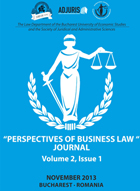THE ROLE OF THE EUROPEAN COMMITTEE FOR SOCIAL RIGHTS (ECSR) IN THE EUROPEAN SYSTEM FOR THE PROTECTION OF HUMAN RIGHTS. INTERACTIONS
WITH ECHR JURISPRUDENCE
THE ROLE OF THE EUROPEAN COMMITTEE FOR SOCIAL RIGHTS (ECSR) IN THE EUROPEAN SYSTEM FOR THE PROTECTION OF HUMAN RIGHTS. INTERACTIONS
WITH ECHR JURISPRUDENCE
Author(s): Cristina SâmboanSubject(s): Law, Constitution, Jurisprudence
Published by: Societatea de Stiinte Juridice si Administrative
Keywords: economic; social and cultural rights (ESCR); European Court of Human Rights (ECtHR); European Committee of Social Rights (ECSR); European Social Charter (revised) (ESC (r)); collective claims (CC)
Summary/Abstract: Upon its foundation in 1961, the European Committee for Social Rights (ECSR) was meant to be a counterpart of the European Court of Human Rights (ECHR) in the field of economic, social and cultural rights, i.e. an international body of control regarding the manner in which states understand to respect human rights. But, given the fastidious contents of ESCR and for political reasons, ECSR has never enjoyed the same guarantee mechanisms or level of accessibility that have characterized ECHR. The aim of this study is to show that, in spite of such flaws, the ECSR has proven its efficiency in the European system for the protection of human rights. The analysis of its decisions, as well as their interactions with the ECHR jurisprudence proves that the flexible and protectionist decisions of this jurisdictional body command authority and their coercive nature is recognized at national level. Moreover, this body has an important influence on ECHR. The jurisprudential interpretations of ECSR may also serve as reference points for national users (lawyers, magistrates, organizations), which makes it even more necessary to know and understand it at this level.
Journal: Perspectives of Business Law Journal
- Issue Year: 2013
- Issue No: 02
- Page Range: 228-233
- Page Count: 6
- Language: English

